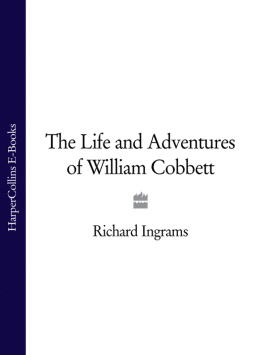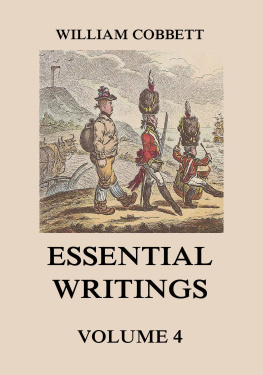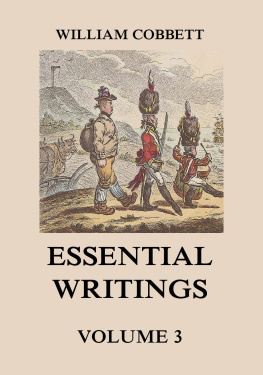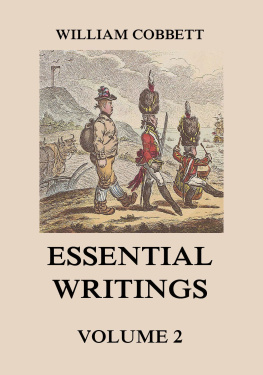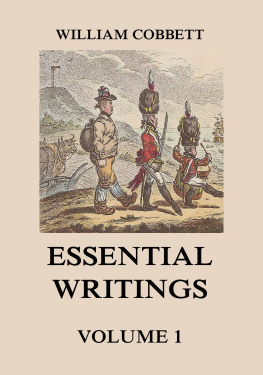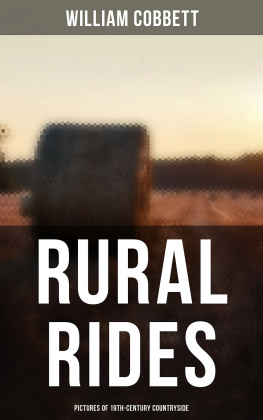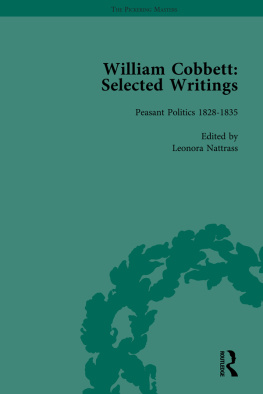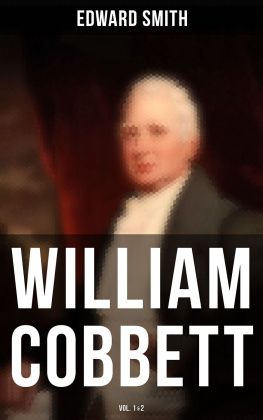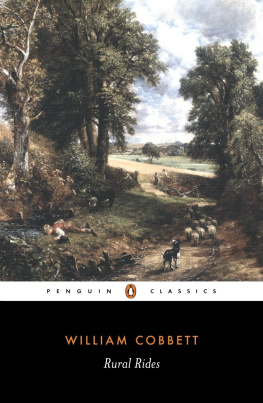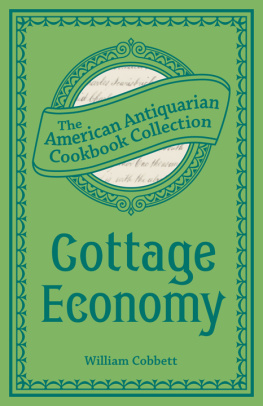
I N HIS Old Mans Diary (1984) A.J.P. Taylor writes: Every now and then someone asks as a sort of parlour game, Who do you think is the greatest Englishman? I have never been at a loss for an answer. Samuel Johnson of course Johnson was profound. He was moral. Above all he was human still I have a qualm. There comes to my mind not perhaps the greatest Englishman but certainly the runner-up. This is William Cobbett.
Yet it is undeniable that Cobbett, nominated for second place by the most readable, most popular historian of our day, is a little-known figure. Some people know him vaguely as the author of Rural Rides. A great many more have never heard of him. Politics aside, you might expect him to be held up to schoolboys as an example of how to write fine, clear English. But he is not. I myself had never read a word of his until I was in my thirties, and then it was thanks to G.K. Chesterton. His short biography published in 1926 inspired me to seek out Cobbetts books, but it proved a difficult task, Rural Rides being the only one that was easily available. I was helped in my search by a friendly bookseller, the late David Low (recommended to me by another lover of Cobbett, Michael Foot), who supplied me with a number of books and, when he retired, gave me his copy of the invaluable bibliography by M.L. Pearl, which is much more than just a list of books and contains a huge amount of information about Cobbetts life and times. Thanks to these acquisitions I was able to compile an anthology of Cobbetts agricultural writing, Cobbetts Country Book, published in 1974 by David & Charles (in the person of the late James MacGibbon).
More recently I have been greatly assisted by Brian Lake of Jarndyce Books, with the result that I have been able to do my researches for the present book mainly at home. I could not, however, have managed without that great institution the London Library, which stocks in its basement all eighty-eight volumes of Cobbetts Political Register. Though most of the Register, like all topical journalism, is of little interest to modern readers, it still contains buried in its pages much of Cobbetts best and most lively writing.
The bulk of Cobbett manuscripts, including family letters, is held by Nuffield College, Oxford, and I am grateful to the Warden and Fellows for permission to quote from this material.
In addition my thanks are due to the following for their assistance: Tariq Ali, John Bradburne, David Chun and Molly Townsend of the Cobbett Society, Clare Cowan, Charles Elliott, Michael Foot, Paul Foot, Rose Foot, Chris Hillier of the Museum of Farnham, Peter Jay, William Keegan, Hilary Lowinger, Sharon Maurice of the Fitzwilliam Museum, Cambridge, Lucy Mulloy, Nick Parker, Helen Richardson, Chris Schuler, Bridget Tisdall, E.S. Turner and A.N. Wilson. My thanks are due to Lady Lathbury for permission to reproduce the portrait of Nancy Cobbett and the silhouette of her daughter Anne. I am especially grateful to my friends Jeremy Lewis and Piers Brendon, both of whom read the manuscript in draft form and made a great many helpful corrections and suggestions.
Lastly I would like to thank Deborah Bosley, not only for her typing skills, but for her continual encouragement and support.
RICHARD INGRAMS
January 2005
1
A SWEET OLD BOY
I MYSELF ONLY SAW this extraordinary character but once, a contributor to Blackwoods Magazine wrote. He is perhaps the very man whom I would select from all I have ever seen if I wished to show a foreigner the beau ideal of an English yeoman. He was then, I shall suppose at least fifty years of age but plump and as fresh as possible. His hair was worn smooth on his forehead and displayed a few curls, not brown then but probably greyish by this time, about his ears. His eye is small, grey, quiet and good-tempered perfectly mild. You would say there is a sweet old boy butter would not melt in his mouth. I should probably have passed him over as one of the innocent bacon-eaters of the New Forest.
A very similar picture is painted by a better-known witness, William Hazlitt: The only time I ever saw him he seemed to me a very pleasant man: easy of access, affable, clear-headed, simple and mild in his manner, deliberate and unruffled in his speech, though some of his expressions were not very qualified. His figure is tall and portly: he has a good sensible face, rather full with little grey eyes, a hard, square forehead, a ruddy complexion, with hair grey or powdered: and had on a scarlet broad-cloth waistcoat, with the flaps of the pockets hanging down, as was the custom of gentleman farmers in the last century, as we see it in the pictures of Members of Parliament in the reign of George I.
The best likenesses of Cobbett confirm the picture given by these two acute observers. The cartoonist John Doyle, who did many drawings of him they are not really caricatures shows him (in old age) a kindly-looking, half-smiling, slightly stooping figure. No one looking at these drawings or reading the descriptions quoted would guess that this sweet old boy was one of the most extraordinary characters in English history, the most effective, most savage and most satirical political journalist of his or any other age.
Cobbett himself is almost our only source for his earliest years. In 1796, when he was living in Philadelphia, he wrote an account of his origins to counter allegations being put about by his enemies that he was a British spy. Though the memoir had a political purpose, it is an honest, straightforward story, as one would expect from someone who always considered himself to be a happy man. There may be some omissions, but there are no deliberate falsehoods.
William Cobbett was born at Farnham in Surrey in March 1763, the third of four sons of George Cobbett, a farmer (and at one time the landlord of the Jolly Farmer Inn, which still stands on the A289 road, now renamed the William Cobbett). He never met his paternal grandfather, but one of his earliest memories was of staying with his widowed grandmother: It was a little thatched cottage with a garden before the door. It had but two windows; a damson tree shaded one, and a clump of filberts the other. Here I and my brothers went every Christmas and Whitsuntide to spend a week or two and torment the poor old woman with our noise and dilapidations. She used to give us milk and bread for breakfast, an apple pudding for our dinner and a piece of bread and cheese for supper. Her fire was made of turf, cut from the neighbouring heath, and her evening light was a dish dipped in grease.
Cobbetts physical and mental energy, his eagerness to be always doing something, would seem to have been with him from the beginning. I do not remember the time, he writes, when I did not earn my living. My first occupation was driving the small birds from the turnip seed and the rooks from the peas. When I first trudged a field with my wooden bottle and my satchel swung over my shoulders, I was hardly able to climb the gates and stiles and at the end of the day to reach home was a task of infinite difficulty. My next employment was weeding wheat and leading a single horse at harrowing barley. Hoeing peas followed and hence I arrived at the honour of joining the reapers in harvest, driving the team and holding the plough. We were all strong and laborious and my father used to boast that he had four boys, the eldest of whom was but fifteen years old, who did as much work as any three men in the Parish of Farnham. Honest pride and happy days.
Cobbett was not quite such an obedient and dutiful son as this account suggests. His elder brother Tom, who later recounted his memories to Cobbetts third son James Paul, remembered him as a lively, rather rebellious boy the foremost in enterprise when anything was on foot, not remarkable for plodding, but rather the contrary, with great liveliness of spirit having a proneness to idle pursuit and to shirk steady work and an obstinate resolution for what he was bent on He must have promised to turn out rather an ungovernable than a tractable youth. When sent to mind the pigs he would throw off a part of his upper clothes and stray away after some business that better suited his taste.
Next page
